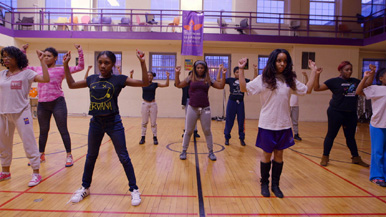Movie Review: Step
By Matthew Huntley
August 29, 2017
BoxOfficeProphets.com

The film follows various members of the first graduating class of the Baltimore Leadership School for Young Women, which has promised to prepare and send each of its students to college. For many of these young ladies, this will be no easy task.
But then, life for African American women, particularly those growing up in Baltimore, has never been easy. Sadly, they've grown accustomed to such hardships as living in dangerous neighborhoods; not knowing where their next meal will come from, or whether the electricity will be on when they get home; and wondering if their parents will have the will and means to support them. The impression we get is these girls have been thrust into adulthood at an age earlier than their non-black, non-Baltimore peers, but while they do have to bear extra responsibility and pressure, they also have the advantage of knowing where they don't want to end up.
Of course, the movie is just a snapshot of life as a young black woman in Baltimore. It is perhaps light and feel-goody at times, but that doesn't make it any less real, honest or emotional. When these girls speak about the struggles they endure, we really appreciate what they're saying. Their words don't just pass through our ears; they stick to us and we find ourselves imagining what it would be like to live in their shoes, and not just when they dance. It's the creation of this empathy where the film earns its stripes.
Director Amanda Lipitz focuses on three main girls as each tries to find a balance between school, preparing for the future, and step dancing, the latter of which gives them focus, camaraderie and a sense of empowerment. Step dancing, the film shows us, can be difficult and grueling, and it's hardly an easy or even mindless exercise, but it's an opportunity for the girls to exhibit control over their bodies and their time, which is a welcome change since they so often find themselves in situations beyond their control.
Of the three girls, Blessin Giraldo perhaps has the biggest hill to climb because of her low GPA and challenging home environment. When she says she wants to turn things around and work harder, we don't immediately believe this will happen, and not because Blessin is lazy or dishonest, but because the odds are so heavily stacked against her. She has a disengaged, chronically depressed mother; she has to worry about things like food not necessarily being on the table for herself, her aunts and her nephew, all of whom live under the same roof; and she's prone to a bad, almost violent attitude when things don't go her way, which causes friction with her teammates.
Cori Grainger, meanwhile, has a cheerful disposition, strong family support, and the kind of grades to be class valedictorian. She also has the ambitions to attend Johns Hopkins University. How she'll do this, we're not exactly sure, because even though Cori's spirit and determination are in the right place, which were no doubt nurtured by her loving mom, who was only 16-years-old when she had Cori, her family doesn't have the financial means, so a scholarship is critical.
Speaking of loving and supporting mothers, Tayla Solomon's is about as enthusiastic and protective as they get (in a good way). When she's not working as a correctional officer in the Baltimore prison system, she's attending Tayla's step practices, soliciting her advice and almost stepping, if you will, on the toes of Coach “G” (Gari McIntyre), who incorporates her own Baltimore upbringing into her instructions and guidance. It's authority figures like Tayla's mom, Coach G and student advisor Paula Dofat who provide the girls the tough love and discipline they need.
The questions of whether the girls will attend college, let alone be accepted, and whether they'll win the state step competition coming up at the end of their senior year seem yanked right out of a Hollywood narrative, as do the traditional sports-movie devices like a “work and practice hard” montage, the gift of brand new uniforms, and the girls walking toward the camera in slow motion before their big performance. We sometimes have to remind ourselves this is a work of non-fiction, a quality that hits home all the more when the girls use the Black Lives Matter movement and Freddie Gray as their theme and inspiration for their dance routine.
Lipitz presents these girls' stories in a safe, digestible manner, and even though Step is “easy” to watch, it's also enormously entertaining and moving, which makes it a prime candidate for a wholesome family drama, which is rare for a documentary. I do wish Lipitz had explored the origins of step dancing more and delved into how it came to BLSWY, as well as the history of the school itself (a greater context of each would have given the film more depth), but in any case, Step is dramatic, funny, sad, and uplifting in one fell, 83-minute swoop, and unlike the aforementioned Hollywood narrative, it's not necessarily predictable. The dance competition sequence is cut in such a way that the film also becomes exciting and suspenseful, so ultimately, during a relatively short runtime, we've experienced a wide range of emotions, and we leave the theater feeling touched, hopeful and alive.